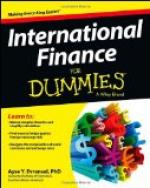If every capitalist only got income from the product of his own work in the past, which he had spent, as in this case, on developing industry, his claim to a return on it would hardly need stating. He would have saved his ten thousand dollars or two thousand pounds, and instead of spending it on two thousand pounds’ worth of amusement or pleasure for himself he would have preferred to put it at the disposal of those who are in need of capital for industry and promise to pay him 5 per cent. or L100 a year for the use of it. By so doing he increases the demand for labour, not momentarily as he would have done if he had spent his money on goods and services immediately consumed, but for all time, as long as the railway that he helps to build is running and earning an income by rendering services. He is a benefactor to humanity as long as his capital is invested in a really useful enterprise, and especially to the workers who cannot get work unless the organizers of industry are supplied with plenty of cheap capital. In fact, the more plentiful and cheap is capital, the keener will be the demand for the labour of the workers.
But when Dr. Nearing points out that the income of the ten thousand dollars would be equally secure if the owner of them had them left him by his father or given him by his uncle, then at last he smites capital on a weak point in its armour. There, is, without question, much to be said for the view that it is unfair that a man who has worked and saved should thereby be able to hand over to his son or nephew, who has never worked or saved, this right to an income




